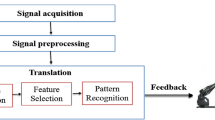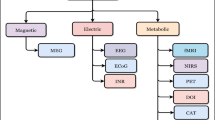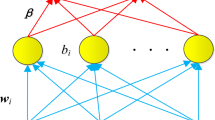Abstract
This paper aims to develop a new fuzzy neural network by incorporating a brain emotional learning controller (BELC) with the fuzzy inference rules. The brain has an orbitofrontal cortex and an amygdala. The BELC is a mathematical model, which imitates judgment and emotion of a brain. So that BELC contains two neural networks; the former is a sensory neural network and the latter is an emotional neural network. These two systems affect each other and this will effectively improve the approximation ability of BELC. By incorporating fuzzy inference system into the BELC, a novel fuzzy brain emotional learning controller (FBELC) is proposed which includes two fuzzy inference systems. The parameter updating rules have an interacting term between two systems, which will increase the learning performance of this system. Then, the developed FBELC is applied to control nonlinear systems. Two examples, a chaotic system and an inverted double pendulum system, are demonstrated to illustrate the effectiveness of the proposed control method. A comparison between the proposed FBELC with other controllers shows that the proposed controller can achieve better control performance than the other controllers.














Similar content being viewed by others
References
Yan, J.J., Shyu, K.K., Lin, J.S.: Adaptive variable structure control for uncertain chaotic systems containing dead-zone nonlinearity. Chaos Solions Fractals 25(2), 347–355 (2005)
Lin, C.M., Mon, Y.J.: Decoupling control by hierarchical fuzzy sliding-mode controller. IEEE Trans. Control Syst. Technol. 13(4), 593–598 (2005)
Lin, C.M., Ting, A.B., Hsu, C.F., Chung, C.M.: Adaptive control for MIMO uncertain nonlinear systems using recurrent wavelet neural network. Int. J. Neural Syst. 22(1), 37–50 (2012)
Puscasu, G., Codres, B.: Nonlinear system identification and control based on modular neural network. Int. J. Neural Syst. 21(4), 319–334 (2011)
Hsu, C.F., Lin, C.M., Yeh, R.G.: Supervisory adaptive dynamic RBF-based neural-fuzzy control system design for unknown nonlinear systems. Appl. Soft Comput. 13(4), 1620–1626 (2013)
Mon, Y.J., Lin, C.M.: Supervisory fuzzy gaussian neural network design for mobile robot path control. Int. J. Fuzzy Syst. 15(2), 142–148 (2013)
Chen, B.S., Wu, C.C., Chen, Y.W.: Human walking gait with 11-DOF humanoid robot through robust neural fuzzy networks tracking control. Int. J. Fuzzy Syst. 15(1), 22–35 (2013)
Marr, D.: A theory of cerebellar cortex. J. Physiol. 202(2), 437–470 (1969)
Albus, J.S.: A new approach to manipulator control: the cerebellar model articulation controller (CMAC). J. Dyn. Syst. Meas. Control 97(3), 220–227 (1975)
Jan, J.C., Hung, S.L.: High-order MS_CMAC neural network. IEEE Trans. Neural Netw. 12(3), 598–603 (2001)
Lin, C.M., Peng, Y.F.: Adaptive CMAC-based supervisory control for uncertain nonlinear systems. IEEE Trans. Syst. Man Cybern. Part B Cybern. 34(2), 1248–1260 (2004)
Chen, J.Y., Tsai, P.S., Wong, C.C.: Adaptive design of a fuzzy cerebellar model arithmetic controller neural network. IEE Proc. Control Theory Appl. 152(2), 133–137 (2005)
Wu, T.F., Tsai, P.S., Chang, F.R., Wang, L.S.: Adaptive fuzzy CMAC control for a class of nonlinear systems with smooth compensation. IEE Proc. Control Theory Appl. 153(6), 647–657 (2006)
Lee, C.H., Chang, F.Y., Lin, C.M.: An efficient interval type-2 fuzzy CMAC for chaos time-series prediction and synchronization. IEEE Trans. Cybern. 44(3), 329–341 (2014)
Lin, C.M., Li, H.Y.: Dynamic petri fuzzy cerebellar model articulation control system design for magnetic levitation system. IEEE Trans. Control Syst. Technol. 23(2), 693–699 (2015)
LeDoux, J.E.: The amygdala: neurobiological aspects of emotion, pp. 339–351. Wiley-Liss, New York (1992)
Balkenius, C., Moren, J.: Emotional learning: a computational model of the amygdala. Cybern. Syst. 32(6), 611–636 (2001)
Moren, J.: Emotion and Learning-A Computational Model of the Amygdala, PhD dissertation, Lund University (2002)
Lucas, C., Shahmirzadi, D., Sheikholeslami, N.: Introducing BELBIC: brain emotional learning based intelligent controller. Int. J. Intell. Autom. Soft Comput. 10(1), 11–22 (2004)
Roshanaei, M., Vahedi, E., Lucas, C.: Adaptive antenna applications by brain emotional learning based on intelligent controller. IET Microw. Antennas Propag. 4(12), 2247–2255 (2010)
Yang, G., Cao, Y., Zhang, L.: Design of brain emotional learning model based hydraulic servo system. 2011 Second International Conference on Mechanic Automation and Control Engineering (MACE), pp. 4874–4876 (2011)
Zarchi, H.A., Daryabeigi, E., Markadeh, G.R.A., Soltani, J.: Emotional controller (BELBIC) based DTC for encoderless synchronous reluctance motor drives. 2011 2nd Power Electronics, Drive Systems and Technologies Conference, pp. 478–483 (2011)
Wang, L.X.: Adaptive fuzzy systems and control: design and stability analysis. Prentice-Hall, Englewood Cliffs (1994)
Lin, C.T., Lee, C.S.G.: Neural fuzzy systems: a neuro-fuzzy synergism to intelligent systems. Prentice-Hall, Englewood Cliffs (1996)
Chang, W.D., Yan, J.J.: Adaptive robust PID controller design based on a sliding mode for uncertain chaotic system. Chaos Solitons Fractals 26(1), 167–175 (2005)
Zhou, S., Feng, G., Feng, C.B.: Robust control for a class of uncertain nonlinear system: adaptive fuzzy approach based on backstepping. Fuzzy Sets Syst. 151(1), 1–20 (2005)
Author information
Authors and Affiliations
Corresponding author
Rights and permissions
About this article
Cite this article
Lin, CM., Chung, CC. Fuzzy Brain Emotional Learning Control System Design for Nonlinear Systems. Int. J. Fuzzy Syst. 17, 117–128 (2015). https://doi.org/10.1007/s40815-015-0020-9
Received:
Revised:
Accepted:
Published:
Issue Date:
DOI: https://doi.org/10.1007/s40815-015-0020-9




